Photographs: Christopher Allbritton/Reuters
Peace talks with Pakistan will resume yet again later this month as Foreign Secretary Nirupama Rao meets with her counterpart Salman Bashir. The result is predictable -- the dialogue will go nowhere. India instead should renew its military-to-military ties for a positive outcome with its neighbours, believes noted defence analyst Ajai Shukla.
The going-nowhere dialogue with Pakistan will restart later this March when Foreign Secretary Nirupama Rao meets with her counterpart Salman Bashir. As our foreign ministry well understands, a fresh start does not guarantee fresh results. The dialogue is doomed to failure for the simple reason that New Delhi will again be talking to proxies, with the real power centre in Pakistan -- the military -- exercising its veto from the shadows.
Few would dispute that New Delhi must engage Pakistan's democratic leadership, providing them credibility and building a constituency for peace. But Indian decision-makers have blundered in leaving all interaction with the Pakistan Army to the United States and the United Kingdom, both of which are being manipulated with consummate ease by a Rawalpindi club that has perfected this art since the Cold War days of Ayub Khan. It is time for New Delhi to buttress its political dialogue with a direct engagement of the men in khaki. The best way to begin that is through military-to-military ties.
...
Change faceless enemies into rivals one meets
Image: Pakistan Rangers and Border Security Force take part in the daily flag lowering ceremony at the joint border post of WagahPhotographs: Mohsin Raza/Reuters
For two reasons, this is a controversial suggestion. The first is democratic India's penchant for playing by the rules: political and diplomatic engagement, New Delhi reasonably believes, is the preserve of politicians and diplomats, not soldiers. The second reason is the outdated apprehension that allowing India's military role in engaging Pakistan might encourage praetorian pretensions of the kind that have politically eviscerated our Western neighbour.
Ask a New Delhi bureaucrat about the possibility of the two army chiefs talking to each other and you will get the acid retort, "There is absolutely no question of General VK Singh discussing the Kashmir issue with General Kayani."
But Kashmir is hardly about to head the agenda in any military-to-military engagement. Many confidence-building measures already exist, including a 1998 prohibition on attacking each other's nuclear facilities; a 2005 agreement to notify each other before testing ballistic missiles; a 1991 agreement to notify each other about military exercises near the border; a 1991 agreement on preventing airspace violations; and agreements for border meetings and communications links, including a hotline between the two director-generals of military operations or DGMOs.
What is needed now is an institutionalised system of visits and exchanges that will turn faceless, nameless, dehumanised enemies into rivals that one knows and meets.
Interaction with Pak army will erode legacy of mistrust
Image: BSF inspectors offers a basket of fruits and sweets to Pakistan Rangers commandersPhotographs: Munish Sharma/Reuters
To illustrate the extent to which distrust prevails -- very few responsible Indians would consider invading Pakistan at short notice today; but the Pakistan Army's General Headquarters at Rawalpindi has, despite assurances from India, decided against thinning out its defences against India to reinforce the troops operating against militants in Khyber-Pakhtunkhwa, the erstwhile North-West Frontier Province.
This complete absence of personal knowledge was not always the case. Until the mid-1970s, senior generals on both sides had served together before independence. General (later Field Marshall) Cariappa could actually consider an impromptu road trip to Lahore at the height of the 1947-48 war to discuss an issue with a Pakistani general.
Today, however, Pakistani and Indian soldiers known each other only as targets in the cross-hairs. But when they meet and work together, for example on United Nation missions, wariness turns quickly into respect and camaraderie. Capitalising on this soldierly affinity, New Delhi must renew its offer to Islamabad -- made earlier in 2004-05, but turned down then by Pakistan of direct military-to-military CBMs.
With military-to-military ties fundamentalist generals will be a thing of the past
Image: Former Pakistan President, General Pervez Musharraf, with KayaniPhotographs: Mian Khursheed/Reuters
The need for engaging the Pakistan Army is especially important as "Zia's children" rise to its highest echelons. The devout Muslims that Zia attracted in large numbers by making religiosity a criterion for promotion are now major generals and would soon become corps commanders, the arbiters of Pakistan's destiny.
General Kayani is not known for any love of radicalised officers. His predecessor General Musharraf, who faced a serious personal threat from radicalised officers, tried hard to weed them out from the promotion chain. Inevitably, though, fundamentalist generals will slip through the cracks and contribute to the radicalisation of that army.
Pak officers should get a chance to see India for what it is
Photographs: Amiruddin Mughal/Reuters
While our Muslims lag deplorably in indices relating to economic and social development, they are far from the tyrannised community of Pakistani demagoguery. Pakistani officers would also get a chance to see India for what it is rather than what it is regarded as in Pakistani army messes.
Indian hardliners, who would oppose any engagement of the Pakistan Army, would do well to remember that the resumption of dialogue this month would not be possible without Rawalpindi's concurrence. The only time the two countries have come near a compromise on Kashmir was when Musharraf, an army chief, spearheaded the dialogue.
Like then, India may end up being surprised by the Pakistani Army's willingness to talk and compromise.

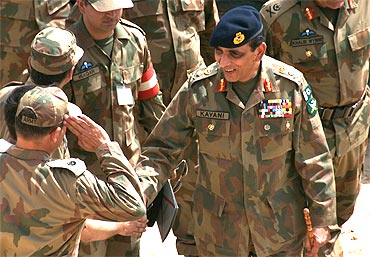
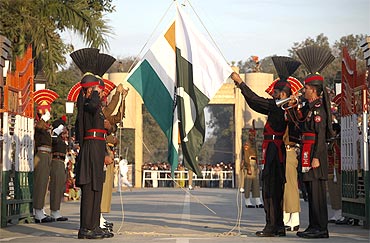
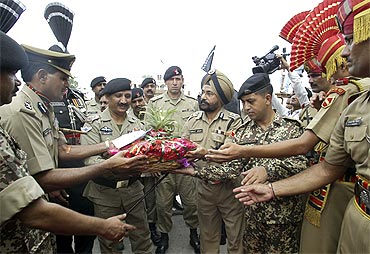
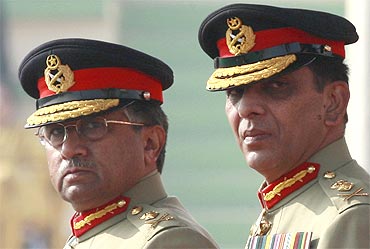
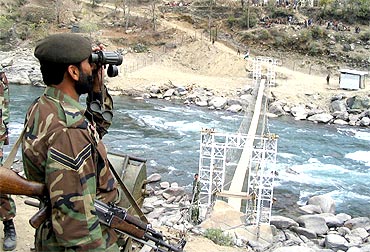

article